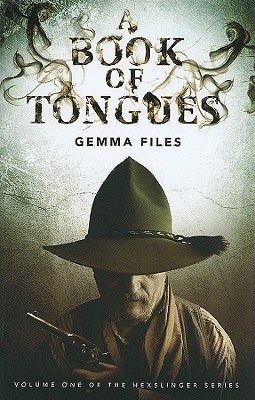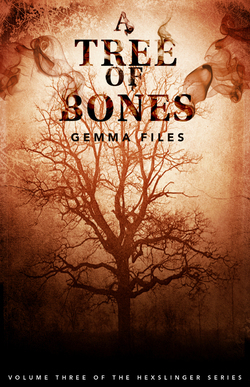Also, at the bottom of this post is a Rafflecopter form; one lucky winner will receive a copy of the Hexslinger Omnibus, which includes all three books from the series plus three short stories set in the Hexslinger universe! Be sure to sign up.
Now, here is Gemma Files!
WHAT I LEARNED FROM WRITING THE HEXSLINGER SERIES, by Gemma Files
It was April of 2009, and my friend Sandra Kasturi—co-founder of ChiZine Publications—asked me if I was finally working on a novel yet, after fifteen years of sometimes award-winning short fiction sales in the horror/dark fantasy genre. “Well,” I said, hesitantly, “as a matter of fact...” “Great! What's it about?” “Um—it's a Weird Western with black magic, Aztec gods, and a big gay romance in the middle.” “Send us what you've got, and write a synopsis for the rest!” I did, they liked it, and by a month after that, this project I'd begun as a way to distract myself from the fact that having lost my job had coincided with my son's diagnosis of Austism Spectrum Disorder was suddenly a professional promise I needed to deliver on: get 100,000 words' worth of manuscript to CZP by roughly October, so it could be turned into a genuine book by sometime the next year.
 Fast-forward to 2013. That one novel—A Book of Tongues—is now three, making up the Hexslinger Series, and the series itself has been reformatted and released in an ebook-only Omnibus Edition (the perfect holiday gift for anybody who likes gunfights, spells, human sacrifice and hot M/M action, hint hint). Thus rolled back together, the story I once blithely thought would take 100,000 words to tell is actually more like 400,000 words-plus, with three all-new stories set in the Hexslinger-'verse slapped on the end, adding almost 30,000 more words to the mix. That's three years of my life, and a sharp shift in the trajectory of my career. I am a known quantity, now. I have fans and followers who are genuinely invested in whatever I do next, not to mention an ever-growing pool of people who recognize my name and may have formed opinions about my work without us having met, or even—on occasion—without them having read anything I've written. It's everything I ever wanted.
Fast-forward to 2013. That one novel—A Book of Tongues—is now three, making up the Hexslinger Series, and the series itself has been reformatted and released in an ebook-only Omnibus Edition (the perfect holiday gift for anybody who likes gunfights, spells, human sacrifice and hot M/M action, hint hint). Thus rolled back together, the story I once blithely thought would take 100,000 words to tell is actually more like 400,000 words-plus, with three all-new stories set in the Hexslinger-'verse slapped on the end, adding almost 30,000 more words to the mix. That's three years of my life, and a sharp shift in the trajectory of my career. I am a known quantity, now. I have fans and followers who are genuinely invested in whatever I do next, not to mention an ever-growing pool of people who recognize my name and may have formed opinions about my work without us having met, or even—on occasion—without them having read anything I've written. It's everything I ever wanted.
And it all happened, in part—fifteen previous years of hard work and professional contact-making aside—because while delivering on my initial promise to CZP, I failed to write one book so egregiously that I actually ended up writing three.
The way it consistently happened was this: I'd get to about the 80,000-word mark, look at my synopsis—the same synopsis I was following throughout, never deviating particularly from its original arc—and go: “Oh crap, there's no way I'm going to be done by 100,000 words.” By the end, Sandra dryly observed that “apparently, the Hexslinger series is a trilogy—and apparently, the only person who that's a surprise for is, strangely enough, Gemma.”
In hindsight, this structural strategy does indeed make a lot of sense, since the longest-form narratives I'd written up to that point were all screenplays; indeed, I'd made my living teaching screenwriting (as well as film history, and TV series development) for almost ten years, before my job suddenly disappeared. Even the fanfiction “novels” I'd written were all done episodically, as only befitted things mainly based on TV shows—and I'd still keep on severely underestimating what organically felt as though it should go where, in some cases ending up with “chapters” that had up to six sub-sections (5.1, 5.2., etc.). So to look back on the Hexslinger series afterwards and realize I'd organized the overall story into three rough “acts,” each taking up a book on its own, was extremely funny. I'd say I won't be doing that again, but frankly? I think I'd be lying.
In a lot of ways, everything I did, I did wrong. Very little pre-planning, and equally little world-building, for which I've been rightly criticized. The extent of my magic-system development was to come up with the rather neat idea that although in the Hexslinger-'verse some random people tend to suddenly bloom up into demigod-level natural magicians when put in life-threatening situations, the reason they haven't banded together and taken over the non-magical world is that they simply can't, because they're instinctually driven to parasite off each other's energy: any relationship between two hexes tends to end in mutually assured destruction via obsessive, addictive, often sexually-charged magic-vampirism. However, I then undercut this “mages don't meddle” truism by almost immediately asking, “Yeah, but what if...?,” and spent the rest of the series playing catch-up.
Essentially, I've discovered, my book-writing process is that I get the emotional beats first, then mess with what's around them—plot, character, theme, infrastructure—while already in transit, until what I know in my gut “should” happen actually can. It's possible that this is a very horror way to look at things, or perhaps a very short story way; it's certainly haphazard, which is a drawback. But the great thing about thinking, and revising, on your mental feet is that just as your characters' own experiences start to change their perspectives, you too will find yourself asking questions about what you've already put in place, and wanting to know more. This is never a bad thing.
For example: I entered A Book of Tongues knowing that I wanted to write a queer main character (proudly gay gunslinger Chess Pargeter) involved in a queer relationship, which is definitely not something that gets a lot of mainstream representation. But by the end of the novel, I was already slightly put off by how much the rest of my story had slanted back towards the default, possibly because even writing a revisionist Western involves playing with typical Western tropes—it was a very white book, a very male book, one in which the few female characters were almost all monsters, whores or whorish monsters, and while I was proud of having tried to screw with the traditional Western image of “Indians” by making Diné hex Grandma school the heck out of my antihero Reverend Rook, Chess's toxic love interest, that still left the two most villainous-appearing people/creatures in the story depicted as women of colour.
So I took up the challenge, and in the Hexslinger series's second installment—A Rope of Thorns—I not only deliberately tried to widen my scope in terms of character development by introducing people like Yancey Colder (a gifted young woman caught up in the fallout from Chess and the Rev's shenanigans, whose actions would turn out to drive much of the rest of the plot) and Yiska (Grandma's protegé, a two-spirited Diné warrior who lives like a man), but also going back and hopefully adding layers to various previously introduced characters (specifically Songbird, the albino Chinese hex mainly introduced to provide exposition and threat in Book, who also ends up in a very different place from where she started out).
Let me be clear—I'm not patting myself on the back, here, since I'm absolutely sure I didn't do any of this without the committing sort of failure that tends to appear whenever a person of privilege addresses intersectional issues while trying to tell an entertaining, well-paced story. But I'm glad for the opportunity, and now that I've done it on the fly once, it's entirely likely that I'll at least think these things over before I try again. This, too, is part of what I learned from writing the Hexslinger series.
 And finally, since I've probably gone on more than long enough—the most wonderful thing that this process taught me is that if I go exactly where I want to go, if I don't self-censor, if I don't tell myself “oh no, don't do that, it's self-indulgent and specious, and no one will ever want to come along for the ride”...sometimes, other people really will respond to it. I'll prove the mainstream, and myself, wrong in its/my assumptions. And in doing so, I'll create something that really does seem to have given far more readers than I ever expected a great deal of enjoyment.
And finally, since I've probably gone on more than long enough—the most wonderful thing that this process taught me is that if I go exactly where I want to go, if I don't self-censor, if I don't tell myself “oh no, don't do that, it's self-indulgent and specious, and no one will ever want to come along for the ride”...sometimes, other people really will respond to it. I'll prove the mainstream, and myself, wrong in its/my assumptions. And in doing so, I'll create something that really does seem to have given far more readers than I ever expected a great deal of enjoyment.Thank you, Gemma! Please feel free to comment if you have any questions or thoughts you want to share!
Here is the giveaway, so good luck! Please note that there is not a PDF file available; you will need to indicate whether you prefer .epub (Nook) or .mobi (Kindle).
a Rafflecopter giveaway


No comments:
Post a Comment
My apologies for the moderation, but I am spending almost an hour a day deleting spam messages. I will approve all comments as quickly as possible.